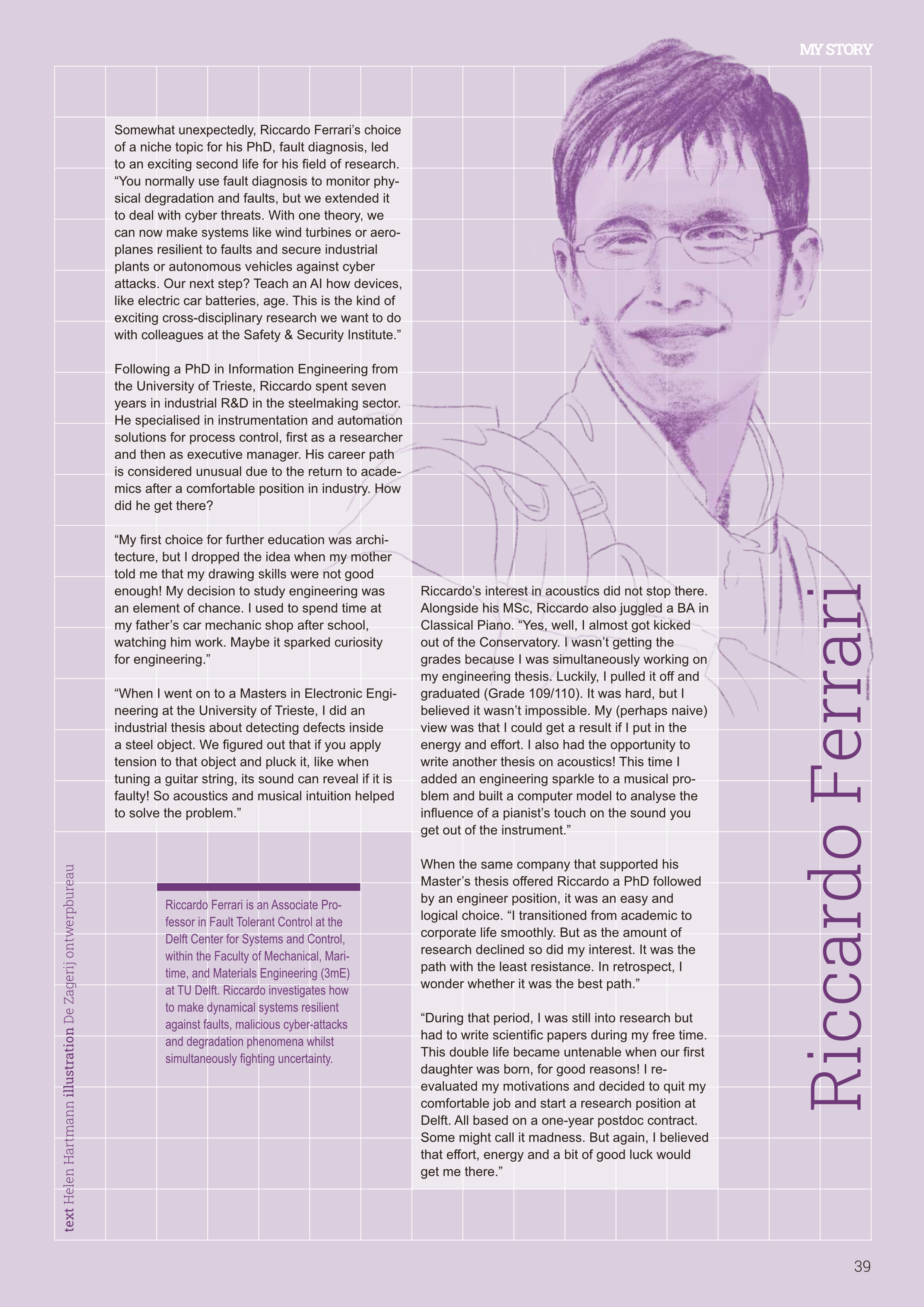Profile of a Safety & Security Researcher: Riccardo Ferrari
Somewhat unexpectedly, Riccardo Ferrari’s choice of a niche topic for his PhD, fault diagnosis, led to an exciting second life for his field of research. “You normally use fault diagnosis to monitor physical degradation and faults, but we extended it to deal with cyber threats. With one theory, we can now make systems like wind turbines or aeroplanes resilient to faults and secure industrial plants or autonomous vehicles against cyber attacks. Our next step? Teach an AI how devices, like electric car batteries, age. This is the kind of exciting cross-disciplinary research we want to do with colleagues at the TU Delft Safety & Security Institute.”
Following a PhD in Information Engineering from the University of Trieste, Riccardo spent seven years in industrial R&D in the steelmaking sector. He specialised in instrumentation and automation solutions for process control, first as a researcher and then as executive manager. His career path is considered unusual due to the return to academics after a comfortable position in industry. How did he get there?
“My first choice for further education was architecture, but I dropped the idea when my mother told me that my drawing skills were not good enough! My decision to study engineering was an element of chance. I used to spend time at my father’s car mechanic shop after school, watching him work. Maybe it sparked curiosity for engineering.”
“When I went on to a Masters in Electronic Engineering at the University of Trieste, I did an industrial thesis about detecting defects inside a steel object. We figured out that if you apply tension to that object and pluck it, like when tuning a guitar string, its sound can reveal if it is faulty! So acoustics and musical intuition helped to solve the problem.”
Riccardo’s interest in acoustics did not stop there. Alongside his MSc, Riccardo also juggled a BA in Classical Piano. “Yes, well, I almost got kicked out of the Conservatory. I wasn’t getting the grades because I was simultaneously working on my engineering thesis. Luckily, I pulled it off and graduated (Grade 109/110). It was hard, but I believed it wasn’t impossible. My (perhaps naive) view was that I could get a result if I put in the energy and effort. I also had the opportunity to write another thesis on acoustics! This time I added an engineering sparkle to a musical problem and built a computer model to analyse the influence of a pianist’s touch on the sound you get out of the instrument.”
When the same company that supported his Master’s thesis offered Riccardo a PhD followed by an engineer position, it was an easy and logical choice. “I transitioned from academic to corporate life smoothly. But as the amount of research declined so did my interest. It was the path with the least resistance. In retrospect, I wonder whether it was the best path.”
“During that period, I was still into research but had to write scientific papers during my free time. This double life became untenable when our first daughter was born, for good reasons! I reevaluated my motivations and decided to quit my comfortable job and start a research position at Delft. All based on a one-year postdoc contract. Some might call it madness. But again, I believed that effort, energy and a bit of good luck would get me there.”
Riccardo Ferrari is an Associate Professor in Fault Tolerant Control at the Delft Center for Systems and Control, within the Faculty of Mechanical, Maritime, and Materials Engineering (3mE) at TU Delft. Riccardo investigates how to make dynamical systems resilient against faults, malicious cyber-attacks and degradation phenomena whilst simultaneously fighting uncertainty.
text Helen Hartmann illustration De Zagerij

